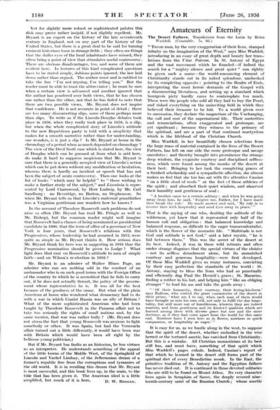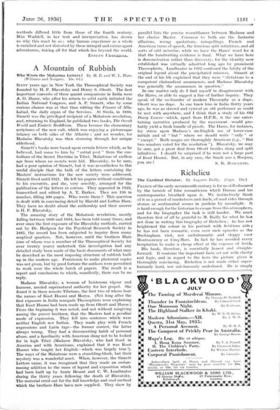Amateurs of Eternity
" THESE men, by the very exaggeration of their lives, stamped infinity on the imagination of the West," says Miss Waddell, introducing in an essay of great depth and beauty her trans- lations from the Vitae Pair-nm. In St. Antony of Egypt and the vast movement which he founded—if indeed the search for a " mighty silence and great quiet " can rightly be given such a name—the world-renouncing element of Christianity stands out in its naked splendour, unchecked by its completing opposite : pointing to the Realm of Ends, interpreting the most heroic demands of the Gospel with a disconcerting literalness, and setting up a standard which bourgeois piety hardly cares to contemplate to much. These were the people who sold all they had to buy the Pearl, and risked everything on the uninviting field in which they believed their treasure to be hid. To a world given over to succession, they declare the magnetism of the Unchanging, the call and cost of the supernatural life. Their austerities and renunciations, often exaggerated and grotesque, are yet significant ; because they witness to the primacy of the spiritual, and are a part of that continual martyrdom which is the lifeblood of the Christian Church.
Miss Waddell, in her beautifully chosen selections from the huge mass of material contained in the lives of the Desert Fathers, has left on one side the more grotesque and savage anecdotes ; and thereby brought into prominence the strange deep wisdom, the exquisite courtesy and disciplined selfless- ness, which were found among the monks of the desert at their best. Bringing to her task the completing graces of a finished scholarship and a sympathetic affection, she almost makes us feel that she too has sat with the attentive Cassian " on a little stool of reeds " at the feet ef those athletes of the spirit ; and absorbed their quiet wisdom, and observed their humility and gentleness of soul : " A brother came to a certain solitary : and when he was going away from him, he said, Forgive me, Father, for I have made thee break thy rule.' He made answer and said, My rule is to receive thee with hospitality and send thee away in peace.' " That is the saying of one who, desiring the solitude of the wilderness, yet knew that it represented only half of the human call and obligation : that balanced knowledge and balanced response, so difficult to the eager transcendentalist, which is the flower of the monastic life. " Multitude is not God and solitude is not God," said a later mystic, " he is hid between them." This was the secret of the desert at its best. Indeed, it was in these wild retreats and often under strange disguises that the special virtues of the cloister —not its selfless detachment alone, but its unmatched courtesy and generous hospitality—were first developed. Of these Miss Waddell gives us many instances, convicting by their easy perfection the standards of the world : St. Antony, staying to bless the lions who had so punctually and efficiently dug Paul the Hermit's grave ; St. Maoarius, finding a robber in his hut, and helping him " hire an obliging stranger " to load his ass and take the goods away :
" Of their humanity, their courtesy, their loving-kindness,' says Rufinus, who visited the great ;iionasteries of the desert in their prime, what am I to say, when each man of them would have brought us into his own cell, not only to fulfil the due hospi- tality, but still more out of humbleness, wherein they are indeed masters, and from gentleness and its kinds el qualities which are learned among them with diverse grace but ,one and the same doctrine, as if they had come apart from the world for this same end. Nowhere have I seen love so in flower, nowhere so quick compassion, or hospitality so eager.' "
It is easy for us, as we hustle along in the west, to suppose that the spirit of the desert, whether embodied in the wise hermit or the tortured ascetic, has vanished from Christianity.
But this is a mistake. All Christian monasticism at its best still has, and must have, something of that spirit which Miss Waddell's pages exhale. Indeed, Cassian's report of that which he learned in the desert still forms part of the spiritual diet of every Benedictine monk. In the East, the primitive tradition of St. Antony and the Egyptian fathers has never died out. It is continued in those devoted solitaries who are still to be found on Mount Athos. Its very character lives again in Seraphim of Sarov, the deeply revered nine- teenth-century saint of the Russian Church ; whose ascetic methods differed little from those of the fourth century. Miss Waddell, in her text and interpretation, has shown us why this must be so ; why human experience as a whole is enriched and not distorted by these intrepid and extravagant adventurers, risking all for that which lies beyond the world.
EVELYN UNLIERUILL.











































 Previous page
Previous page